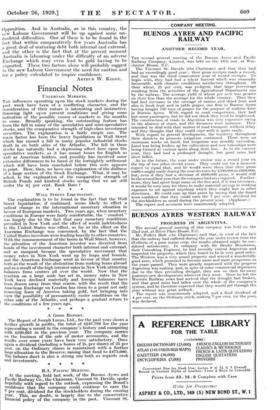WALL STREET LIQUIDATION.
The explanation is to be found in the fact that the Wall Street liquidation, if continued, seems likely to effect a radical change in the international monetary situation in favour of European markets. Two years ago, when monetary conditions in Europe were fairly comfortable, the " comfort ' was largely due to the fact that easy monetary conditions prevailed in New York and the effect of world indebtedness to the United States was offset, so far as the effect on the American Exchange was concerned, by the fact that the United States investors were lending heavily to other countries. With the commencement of the boom in Wall Street, however, the attention of the American investor was diverted from bonds of the investment character both internal and external, and so rampant became the speculative movement that money rates in New York went up by leaps and bounds, and the American Exchange went in favour of that country both as the result of the abstention from making loans abroad and as a result of the high interest rates in New York attracting balances from centres all over the world. Now that the reaction on a large scale has set in, money rates in New York have declined materially and foreign balances have been drawn away from that centre, with the result that the American Exchange on London has risen to a point not only removing fears of America taking gold, but bringing into view the possibility of permanently easier conditions on the other side of the Atlantic, and perhaps a gradual return to the conditions of a few years ago.


















































 Previous page
Previous page